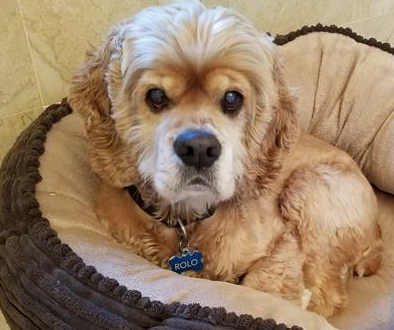I will be attending two celebrations of life this month.
The first is for my friend Margaret.
I wrote about her in one of my recent columns, about her surprise 90th birthday party with 50 of her friends and neighbors. Margaret died in December, a week before she was scheduled to go on a trip to Africa.
I am comforted by the thought that people got to celebrate her 90th birthday with her.
The other is for a 50-year-old work colleague who was killed by a stray bullet. He leaves behind a wife and children. His death is senseless, tragic, and shocking.
I add to this something which I have been unable to write about thus far, because it’s been too painful: the recent death of my beloved rescue Cocker Spaniel, Rolo.
Rolo was my best friend and provided me with unconditional love and companionship. I still have a huge hole in my heart, even though he died three months ago.
I am a bit overcome with grief and sadness right now. There is so much loss coming at once.
I am surely not alone in my feelings; grief can occur even without a death.
I think of my neighbor who has had three falls, resulting in broken bones in the past few months. Just out of a cast for days, a new fall resulted in a new break.
My friend, of course, is depressed as she so loves running, and is unable to do her favorite activity, or almost any activity, due to a healing arm and foot.
Her daughter tells her she can have one or two more days to feel sorry for herself, and after that she needs to “snap out of it” and resume her life. Easy to say.
And then there’s my Uncle Al, who, at age 89, recently had a kidney removed because a tumor was growing in it.
While, according to the doctor, his surgery was a success and his recovery is going well, when his daughter asks him how he is doing, he says he’s about 50%. He doesn’t want to leave the house and is not really enjoying things he once did.
Some family members chalk it up to his not knowing how to deal with medical issues, as he never had any in his life, but I am guessing there is a certain amount of grief and loss he is dealing with.
The inherent challenge of living a long life is that generally we will experience more grief and loss. I think there are a lot of older adults walking around with grief and sadness in their hearts. Often it is unspoken.
Why bother to bring up gloomy thoughts to others? It’s not sympathy we need, but a way to come to terms with our grief and eventually move on. But are we ready to move on? Does moving on mean forgetting about our loss?
In the case of Rolo, for example, I don’t want to forget him. He was my best friend for 14 years. If I don’t keep him “alive” in my thoughts and memories, will his life mean nothing?
I do know there are ways out of grief. We host a grief support group here at Senior Concerns for people who have lost a spouse with dementia.
I have watched week in and out as these brave individuals come to share their feelings and their stories. Over time, I can see grief lifting, as they exit the meetings, in their smiles and in words to our staff.
Experts say that the first step in dealing with the grieving process is to acknowledge your pain and to accept that grief can trigger many different and unexpected emotions. It may be feeling overwhelmed, sad, or depressed.
They say that each person’s grieving process is different.
I say don’t think that grief is only associated with the death of someone you care for. If you feel a sense of loss, you may be grieving.
We don’t need to be alone in our grief. Seek face-to-face support from people who care about you. You will find in almost all cases, it is their honor and privilege to be there for you because they love you.
If you are feeling overwhelmed, and have nowhere to turn, please call 988, the Suicide and Crisis Lifeline. They are available 24 hours a day.
To paraphrase what Thomas Fuller so wisely said, it’s always darkest before the dawn. Better days are ahead.





